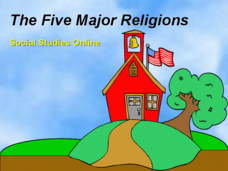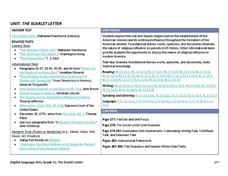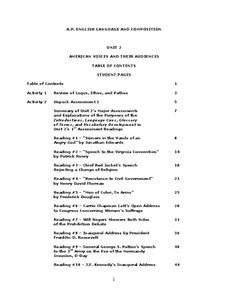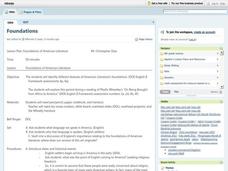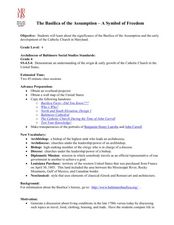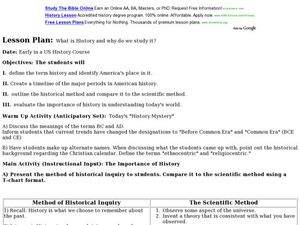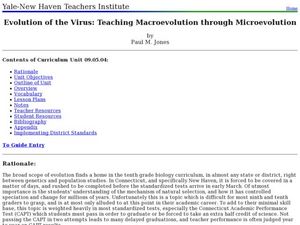Core Knowledge Foundation
Early World Civilizations Tell It Again!™ Read-Aloud Anthology
Ancient world civilizations are the focus of a read-aloud anthology. First graders explore the early world of Mesopotamia, Babylon, the sphinx, and pyramids, get to know people of the Nile, Hatshepsut, and Tutankhamun, and examine world...
Curated OER
The Five Major Religions
Your 7th graders will have no problem understanding the similarities and difference in the tenets of the world's 5 major religions. This PowerPoint covers the history, major players, and philosophy of Christianity, Islam, Buddhism,...
Curated OER
Immigration and Ancestors
We are all immigrants to this country and the study of immigration can help students connect to history in a personal way. Students will listen to audio clips from the Ellis Island web site, discuss the treatment of immigrants in the...
Curated OER
Roman and Early Christian Art
Third graders explore pattern, texture, balance, symmetry as they examine Roman and Byzantine art in the four lessons of this unit. Details of the major art works studied are placed into a booklet for presentation to the class.
Louisiana Department of Education
The Scarlet Letter
Use Nathanial Hawthorne's immortal text on the influence of religion on the early American settlements, as well as its continued impact on American culture, with a unit that focuses on The Scarlet Letter. In addition to Hawthorne's...
Northshore School District
American Voices and Their Audiences
Those new to teaching an AP level language and composition prep course and seasoned veterans will find much to treasure in a unit that is designed to help young language scholars develop the skills they need to analyze the language...
Curated OER
THE BELIEFS OF CHRISTIANITY: J.E.S.U.S.
In this beliefs of Christianity study guide worksheet, students read a brief overview pertaining to topic and then respond to 5 reflection questions.
Museum of Tolerance
Disenfranchised People of the New Nation
Why are some immigrant groups in the United States embraced while others become disenfranchised? To answer this question, teams investigate why groups emigrated to the US, why some of these these peoples were disenfranchised, and their...
Curated OER
Pilgrims and Puritans
With graphic organizers galore, learners will follow the changes of church and state in early colonial America. They look at the differences between the pilgrims and the puritans in terms of beliefs and life ways. Myths and...
Curated OER
Spain in Puerto Rico: The Early Settlements
Students participate in a lecture to discover the history of how Puerto Rico was changed after Spain discovered the island. In groups, they compare and contrast the conditions on the island before and after Columbus' discovery. To end...
University of Florida
Sailing to St. Augustine
Using a Florida map from 1597, young explorers consider the physical characteristics they would need in a site for a new colony and the resources they would need to survive. After selecting a site, class members research to discover the...
National Endowment for the Humanities
David Walker vs. John Day: Two Nineteenth-Century Free Black Men
What was the most beneficial policy for nineteenth-century African Americans: to stay in the United States and work for freedom, or to immigrate to a new place and build a society elsewhere? Your young historians will construct an...
Curated OER
Reformation Simulation
Students discover the Medieval reformation. For this ethics lesson, students simulate council and government bodies to determine responses to various opinions regarding religion and ethics. They determine what postilions to take and why...
Curated OER
Birth and Early Childhood
Eighth graders read and compare creation stories of different cultures around the world. They identify and define the concept of the cycle of life and collect and analyze birth and childhood folk beliefs and stories in their families...
Curated OER
Blasphemy! Salman Rushdie and Freedom of Expression
Learners explore the concepts of blasphemy, censorship and freedom of expression through the lens of Salman Rushdie. They also consider how these issues have been reflected in US history.
Curated OER
One in the Spirit
Students discover ideas of community in the Bible. In this Christian community lesson, students read several passages of scripture to find out the Biblical definition of fellowship. Students find out how the early church is a good...
Curated OER
Comparing Ethnic Groups
Eleventh graders explore the relationship between the United States and the Native Americans from after the Civil War to the early 1900's. They evaluate the actions of the United States towards Native Americans and compare the actions to...
Curated OER
Comparing Covenants
Fifth graders investigate what a covenant was and how they relate to contemporary government ideals. In this comparing covenant lesson, 5th graders examine primary source documents that are examples of covenants from 18th century New...
Curated OER
Foundations
Learners investigate the history of literature in America by looking at the types of genres first read in the United States. They look at the foundations of how the original colonists had the intention of transmitting religious and moral...
Stanford University
Jacob Riis
Fourth graders view and discuss the photographs of Jacob Riis.In this Jacob Riis and Immigrants instructional activity, 4th graders analyze the photographs of Jacob Riis and answer questions about the feelings evoked by the photographs....
Curated OER
The Basilica of the Assumption-A Symbol of Freedom
Fourth graders explore the importance of the Basilica of Assumption and the development of the Catholic Church in Maryland. In this social studies lesson, 4th graders discuss the Basilica of the Assumption and the Catholic Church.
Curated OER
What is History and Why Do We Study It?
Students examine why it is important to study American history. In this American history lesson, students discuss why it is necessary to study history, arrange an outline of American history events in chronological order, and write an...
Curated OER
Evolution of the Virus: Teaching Macroevolution Through Microevolution
Students describe the anatomy of a virus. In this biology lesson, students compare and contrast the characteristics of bacteria and viruses. They discover the genetic adaptations of viruses over time.
Curated OER
Olympics (World Celebrations)
Students recognize the meanings and symbolism of the Olympic Flag and Torch and apply this to their own feelings of the classroom by creating their own symbol/flag to represent these feelings.



